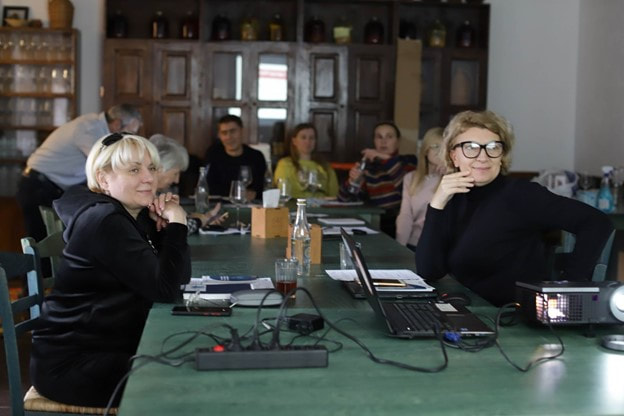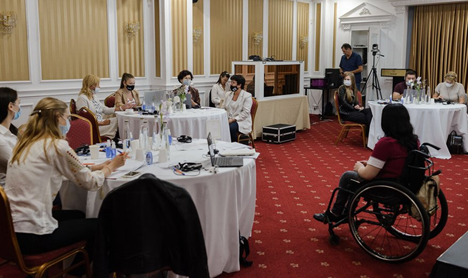Under this project, WAGE works with two Moldova-based organizations, the Center for Entrepreneurship and Economic Policy (CAPE) and the Women’s Law Center (WLC), to strengthen the organizational capacities of women’s business associations (WBAs) and women’s civil society organizations (WCSOs). These efforts work to accomplish the project’s two goals: 1) to create a better understanding surrounding the relationship between women’s economic empowerment and gender-based violence and 2) strengthen the capacities of participating WCSOs and WBAs to develop an Alliance to advocate for a more robust environment for women’s economic empowerment in Moldova.
Women’s Economic Empowerment in Moldova
At the start of the project, CIPE and ABA ROLI conducted a Gender and Inclusion Analysis to identify the multifaceted social, political, economic, and legal issues facing Moldovan women.The analysis and its following blog article highlight Moldova’s long history of gender equality measures being written into legislation, as well as several international and regional agreements relevant to promoting gender equality that Moldova has ratified, such as the Council of Europe Convention on preventing and combating violence against women and domestic violence, known as the Istanbul Convention. Despite these initiatives, the project team identified interconnected barriers hindering women’s economic empowerment. Women face deeply embedded patriarchal norms and stereotypes that play out across all facets of their lives. For example, socio-cultural expectations of caregiving and child rearing that fall heavily on women, gendered workplace and economic segregation, unresponsiveness of criminal justice institutions to instances of GBV particularly in rural areas, and male-dominated institutional gender biases within government and the private sector. The declining availability of affordable childcare and the lack of flexible work arrangements exacerbate these structural and social constraints. The Gender and Inclusion Analysis found that such constraints lead to disproportionate discrimination against LGBTI women, ethnic minorities such as the Gagauz and Roma, women living in rural areas, women living in the Transnistria region, and women with disabilities. These insights informed the development of project activities, including identifying topics for organizational capacity-building sessions and establishing advocacy priority topics for the future Alliance.
Organizational Development Program
At the beginning of the initiative, CIPE selected ten WBAs and WCOs to participate in the project’s organizational development program. The Alliance of Small to Medium Sized Enterprises (AIM), the Association of Women Entrepreneurs in Moldova (AFAM), the Association of Women Entrepreneurs from Balti (AFA Balti), the Association of Light Industry Employers (APIUS), NGO Stimul, the Association of Entrepreneurs with Disabilities (AEFL), NGO Vesta, the Center Partnership for Development, NGO Resonance, and Women’s Initiatives all participated in the organizational development program consisting of organizational training sessions, one-on-one coaching sessions with expert mentors, and a small grants program that empowers women’s organizations across Moldova to make improvements that serve their members and constituents.
The project team designed and delivered six training sessions on topics including advancing gender equality and diversity within organizations, developing a Code of Conduct, and tips for understanding the practical aspects of organizing and conducting a General Assembly. In addition to the training sessions, CIPE organized a virtual networking event, “Women Entrepreneurs and Business Associations: Doing Business Differently, Including in Pandemic Times,” which brought together women entrepreneurs and WBAs from Moldova, Georgia, and Ukraine. Participants learned how women entrepreneurs and civil society organizations could work together to promote gender equality and create an enabling environment for women to participate in the private sector.
Apart from the capacity-building sessions, CIPE engaged six mentors from Romania and Ukraine to conduct one-on-one coaching sessions with the project’s participants. The mentors include CIPE staff and consultants skilled in association and CSO development, advocacy, and women’s economic empowerment. The mentors held more than 50 one-on-one coaching sessions where mentees learned how to develop working models that are economically, socially, and environmentally sustainable, how to implement effective fundraising strategies, and the importance of financial sustainability. In addition to CIPE’s one-on-one mentorship program, ABA ROLI provided technical assistance in GBV response and prevention integration to ensure the program took into consideration the very real GBV risk that women face as an unintended consequence to WEE. Additionally, WAGE’s local partner WLC worked with four WCSOs to identify gaps in their internal policies related to gender equality, women’s equal access to employment opportunities, and prevention of harassment practices. At the end of the first year, three WCSOs, with support from WLC, drafted new internal policies to address women’s barriers in achieving full economic empowerment. The mentorship program concluded in February 2022.
Lastly, nine WBAs and WSCOs received small grant awards to implement a wide range of activities to build their organizational capacity. These activities include developing websites, internal policies and regulations, membership recruiting campaigns, promotional videos, and strategic plans.
After receiving organizational support for enhanced capacity development, these WBAs and WCSOs came together to form a new Alliance to jointly advocate for women’s economic empowerment in Moldova.

Women’s Economic Empowerment Alliance
 Goals for Year Two
Goals for Year Two
In spring 2022, WAGE’s local partners plan to formally launch the Alliance and develop a Women’s Legislative Agenda with CIPE and ABA ROLI support.WAGE also plans to conduct a Policy Advocacy Needs Assessment to identify implementation gaps in the current legal framework, as well as legislative and/or policy priorities to address societal barriers to women’s economic empowerment and employment, including gender-based violence. Based on the assessment’s findings, the Alliance members will then develop a Women’s Legislative Agenda, a key tool for the Alliance’s policy advocacy efforts. The members will also lead an advocacy campaign to improve the enabling environment for women to participate in the Moldovan economy. ABA ROLI and WLC will also work with partner WBAs, including members of the Alliance, to improve resources they offer to support their members if and when they do encounter GBV. WLC will also continue hosting a dialogue series with WBAs to discuss issues pertaining to the intersection between WEE and GBV.
In the first year, the initiative’s achievements reflected the progress WBAs and WCSOs have made in developing their organizational capacity and establishing an advocacy platform for women’s economic empowerment. The efforts of these Moldovan WBAs and WCSOs have not gone unnoticed as they continue to support the influx of Ukrainian refugees in Moldova as a result of Russia’s invasion of Ukraine. WAGE partners continue to monitor how the ongoing war and refugee crisis affects the enabling environment for women in Moldova and how these organizations can combat the consequences, including a rise in GBV and discrimination. Project partners plan to advocate on behalf of all women through the Women’s Economic Empowerment Alliance, and the project team remains committed to empowering WAGE’s partners and project participants to advocate a business environment that serves the needs of all women in Moldova, including refugee women.
Posted on April 26, 2022
*Disclaimer: The views and opinions expressed in this blog post do not necessarily reflect the views of the United States Government.
Women and Girls Empowered (WAGE) is a global consortium to advance the status of women and girls, led by the American Bar Association Rule of Law Initiative (ABA ROLI) in close partnership with the Center for International Private Enterprise, Grameen Foundation, and Search for Common Ground. WAGE works to strengthen the capacity of private sector organizations (PSOs) and civil society organizations (CSOs) in target countries to improve the prevention of and response to gender-based violence (GBV); advance the women, peace, and security (WPS) agenda; and support women’s economic empowerment (WEE). In this context, WAGE provides direct assistance to women and girls, including information, resources, and services they need to succeed as active and equal participants in the global economy. WAGE also engages in collaborative research and learning to build a body of evidence on relevant promising practices in these thematic areas. To account for the deeply interconnected nature of women’s and girls’ experiences, WAGE’s initiatives employ approaches that are highly collaborative, integrated, and inclusive. WAGE is funded by the U.S. Department of State Secretary’s Office of Global Women’s Issues.
Published Date: April 27, 2022
